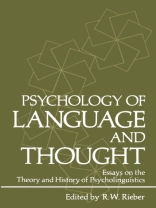The fact that one would contemplate publication of a book such as this indicates both the maturity and the growth of activity that have taken place in the field of psycholinguistics over the past few decades. More- over, the fact that psycholinguists and/or scholars of the history of ideas are interested in the history of their subject clearly demonstrates that much has been accomplished, and the time is indeed ripe for the reassess- ment of whence we have come. In addition, perhaps this interest in our historical past suggests that psycholinguistics is at a critical stage in its development. There are many scholars who believe that this critical stage manifests itself primarily in a search for a new paradigm. It would seem only reasonable to suggest that when members of a profession are search- ing for something new, more than likely they will take time to reflect on the past in the hope that it will facilitate the fulfillment of their quest. This book as such reflects a wide-ranging search for historical roots over a millenium of research in the psychology of language and thought. Furthermore, it also reflects an attempt to open the context by introducing the broader perspectives of the history of ideas and the history of science together with their reassessment of the method of science motivated from within psychology itself.
Robert W. Rieber
Psychology of Language and Thought [PDF ebook]
Essays on the Theory and History of Psycholinguistics
Psychology of Language and Thought [PDF ebook]
Essays on the Theory and History of Psycholinguistics
यह ईबुक खरीदें और 1 और मुफ़्त पाएं!
भाषा अंग्रेज़ी ● स्वरूप PDF ● ISBN 9781468436440 ● संपादक Robert W. Rieber ● प्रकाशक Springer US ● प्रकाशित 2013 ● डाउनलोड करने योग्य 3 बार ● मुद्रा EUR ● आईडी 4730769 ● कॉपी सुरक्षा Adobe DRM
एक DRM सक्षम ईबुक रीडर की आवश्यकता है












